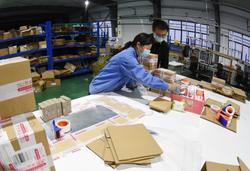 In this undated file photo, employees pack cosmetics imported from South Korea at a cross-border e-commerce park in Lianyungang, Jiangsu province. (GENG YUHE / CHINA DAILY)
In this undated file photo, employees pack cosmetics imported from South Korea at a cross-border e-commerce park in Lianyungang, Jiangsu province. (GENG YUHE / CHINA DAILY)
Trade agreement to optimize, integrate regional supply chains and resources
The Regional Comprehensive Economic Partnership agreement, signed by 15 Asia-Pacific countries on Sunday, is a boon to the burgeoning cross-border e-commerce industry and will further optimize and integrate regional supply chains and resources, as well as improve the efficiency of cross-border logistics, industry experts said on Wednesday.
The RCEP will propel the establishment of a more standardized and unified trading system in the region, create a sound environment for e-commerce and reduce the operational risks of cross-border business participants.
Diane Wang, founder and chairwoman of DHgate
Involving China, Japan, South Korea, Australia, New Zealand and the 10 member states of the Association of Southeast Asian Nations, the RCEP agreement mentions boosting the development of regional e-commerce, which includes the facilitation of paperless trading, electronic authentication and electronic signatures, as well as online personal information protection, according to the Ministry of Commerce.
"The RCEP will propel the establishment of a more standardized and unified trading system in the region, create a sound environment for e-commerce and reduce the operational risks of cross-border business participants," said Diane Wang, founder and chairwoman of DHgate, a Chinese cross-border business-to-business e-commerce platform.
"It will further optimize the regional supply chain and resources, and bring about more conveniences for DHgate in terms of national resources, commodity flow, technological cooperation, services, capital and talent," said Wang.
ALSO RAED: RCEP will pave way to shared future
According to Wang, the RCEP will significantly accelerate the digitalization push of the cross-border e-commerce supervision system and bolster the digital trade which covers paperless trade, electronic authentication and electronic signature. In addition, with the signing of the RCEP, foreign trade enterprises in China can further expand their footprint in the ASEAN countries, which represent huge market potential, said Wang.
Zhang Zhouping, a senior analyst on B2B and cross-border activities at Internet Economy Institute, a domestic consultancy, said the cross-border e-commerce activities often involve various policies and business environment in different countries.
"The RCEP will facilitate trade among member countries in the region and lower business uncertainties. China is taking the lead in the cross-border e-commerce segment, and its cross-border e-commerce business model and regulatory measures might be extended and duplicated to more countries within the RCEP region," said Zhang.
Xu Lei, chief executive officer of JD Retail, the retail unit of Chinese e-commerce giant JD, said the company will pay more attention to duty-free products and cooperation in the cross-border segment. "We will take full advantage of our strength in cooperation with international brands and also our supply chain capacity," said Xu.
READ MORE: Digital platform to support cross-border e-commerce
China's cross-border e-commerce sector has been growing exponentially over the past few years as the country's middle and high-income shoppers are demanding increasingly diversified and personalized products and services.
During the first six months of the year, China's trade volume via cross-border e-commerce platforms overseen by Customs authorities increased by 26 percent on a yearly basis, with exports rising by nearly 29 percent, data from the General Administration of Customs showed
Bai Ming, deputy director of the international market research institute under the Ministry of Commerce, said the new trade pact will have a positive effect on global cross-border e-commerce, and improve the efficiency of cross-border logistics and Customs clearance, reduce the distribution time and costs, and improve shopping experiences for consumers.
Now that the RCEP deal has been reached, raw material and production costs and tariffs on imported products are set to be lowered, so that Chinese consumers can purchase a wider range of high-quality overseas commodities at lower prices, said Chen Tao, an analyst with internet consultancy Analysys in Beijing.
Chen said that it will also promote broader cooperation in the e-commerce sector between China and Southeast Asian, and East Asian countries; and China's advanced experiences and model in cross-border e-commerce will be introduced to and shared with other member countries in the RCEP region.
ALSO READ: Australia says RCEP 'incredibly important agreement'
During the first six months of the year, China's trade volume via cross-border e-commerce platforms overseen by Customs authorities increased by 26 percent on a yearly basis, with exports rising by nearly 29 percent, data from the General Administration of Customs showed.
Market consultancy iiMedia Research said the transaction scale of the country's cross-border online shopping is expected to rise from 10.8 trillion yuan (US$1.7 trillion) in 2019 to 12.7 trillion yuan this year.


